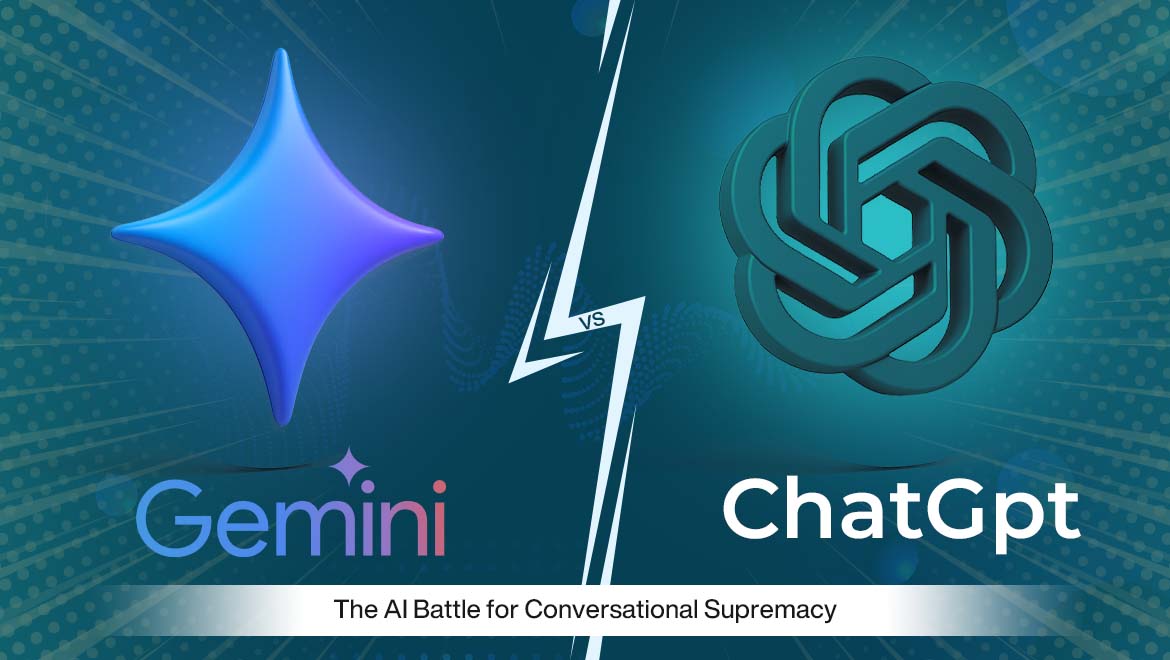

- By Admin
- 12 May, 2025
- 5 min Read
ChatGPT vs Gemini: The AI Battle for Conversational Supremacy
In today’s fast-paced digital world, AI chatbots have rapidly become productivity powerhouses—fueling creativity, accelerating research, and transforming how we communicate. Two of the biggest names in this evolving space are OpenAI’s ChatGPT and Google’s Gemini (formerly Bard). But with both tools offering impressive capabilities, the question remains:
Which one truly stands out?
Let’s dive into a head-to-head comparison of these conversational AIs based on functionality, accuracy, integrations, user experience, and real-world use cases.
1. Origins and Core Technology
- ChatGPT is developed by OpenAI, built on its GPT (Generative Pre-trained Transformer) architecture. The most recent premium model, GPT-4, powers ChatGPT Plus, offering advanced reasoning, image processing, coding, and memory capabilities.
- Gemini, previously known as Bard, is Google’s answer to ChatGPT, leveraging its Gemini AI model (formerly LaMDA and PaLM) and integrating deeply with Google’s ecosystem, like Search and Workspace.
Winner: Draw. Both are backed by industry giants with deep AI research roots.
2. Capabilities and Performance
- ChatGPT shines in creative writing, code generation, and structured task handling. It can take on anything from composing essays and poems to debugging Python code.
- Gemini performs well in search-based tasks and fact-checking due to its real-time internet access and integration with Google Search.
Winner: ChatGPT for creative tasks, Gemini for real-time facts.
3. Memory & Personalization
- ChatGPT (especially GPT-4-turbo) now includes memory features, allowing it to remember preferences, past conversations, and user context, making interactions feel more personalized over time.
- Gemini does not yet have an equivalent persistent memory system for free or regular use.
Winner: ChatGPT.
4. Integration with Tools
- Gemini is natively integrated into Google Workspace—Docs, Sheets, Gmail—making it a great AI assistant for users in the Google ecosystem.
- ChatGPT offers plugins, custom GPTs, and code interpreter (Python tool), allowing developers, data analysts, and power users to perform complex workflows.
Winner: Depends on the user. Gemini for everyday productivity, ChatGPT for advanced workflows.
5. UI & User Experience
- ChatGPT offers a clean, flexible UI with options to create custom GPTs and explore others’ models.
- Gemini’s interface is more minimal but tightly integrated with Google’s services. However, it sometimes feels less refined in creative conversation.
Winner: ChatGPT for versatility, Gemini for quick, search-heavy tasks.
6. Real-Time Web Access
- ChatGPT-4 (web-browsing) has browsing capabilities for current events, but it’s limited to Plus users.
- Gemini’s comes with native real-time search access for all users, giving it a powerful edge in pulling live, accurate data.
Winner: Gemini.
7. Privacy and Data Usage
- OpenAI allows users to turn off chat history and control memory in ChatGPT.
- Google’s Gemini, integrated across accounts, may raise questions about how it uses personal data—though Google has been introducing more AI privacy features.
Winner: Varies by user trust. OpenAI provides more direct privacy controls in ChatGPT.
Conclusion: Which One Is Right for You?
| Use Case | Best Choice |
|---|---|
| Writing & Creativity | ChatGPT |
| Real-Time Information | Gemini |
| Personalized Memory | ChatGPT |
| Google Docs/Sheets Integration | Gemini |
| Complex Code & Data Tasks | ChatGPT |
| Free Access to Web Search | Gemini |
